- Home
- Isabel Allende
The Soul of a Woman Page 2
The Soul of a Woman Read online
Page 2
* * *
Allow me a brief digression regarding inequality. Until 2019 Chile was considered an oasis in Latin America, a prosperous and stable country on a continent shaken by political uncertainty and violence. On October 18 of that year, the country and the world were surprised by an explosion of populist anger. Optimistic economic figures had been released that didn’t reflect the distribution of resources or the fact that income inequality in Chile is among the highest in the world. The economic model of extreme neoliberalism imposed by General Pinochet’s dictatorship in the 1970s and 1980s privatized almost everything, even basic services like water, and gave carte blanche to capitalists while the labor force was harshly repressed. That created an economic boom for a while, and allowed for the unbridled enrichment of the few, while the rest of the population survived on credit. It was true that according to statistics, poverty had diminished to less than 10 percent, but that figure didn’t show the hidden poverty of the lower middle class, blue-collar workers, and retirees. Discontent had been accumulating for more than thirty years.
In the months following October 2019, millions of people marched in the streets of the main cities of the country. In the beginning, the protests were peaceful, but soon acts of vandalism occurred. The police reacted with a brutality that had not been seen since the time of the dictatorship.
This movement, which had no visible leaders and was not linked to any political party, was joined by different sectors of society with their own grievances: indigenous people, students, unions, and professionals. And, of course, feminist groups.
* * *
“You are going to be on the receiving end of a lot of male aggression and will pay a high price for your ideas,” my worried mother warned me. With my character I was never going to get married, and spinsterhood was the worst fate. One became a spinster around twenty-five years old, so speed in landing a husband was necessary. Girls took great pains to catch a boyfriend and get married quickly, before other, smarter girls got the best matches. “I also abhor machismo, Isabel, but there’s nothing to be done; the world is like this and always has been,” Panchita told me. I was a voracious reader and what I had learned in books confirmed that the world changes constantly and humanity evolves, but the changes are only obtained after much struggle.
I am impatient; now I understand that I was trying to inject feminism into my mother against her will, without considering that she was from another era. I belong to the transitional generation—between our mothers and our daughters and granddaughters—that imagined and propelled the most important revolution of the twentieth century. It could be argued that the Russian Revolution of 1917 was the most remarkable, but the feminist revolution has been deeper and more lasting: It affects half of all humankind. It has spread and touched millions and millions of people and offers the strongest hope that this civilization in which we live could be replaced by a more evolved one. That both fascinated and scared my mother. She had been brought up with another of my grandfather Agustín’s axioms: Better the devil you know than the devil you don’t.
Maybe I have given you the impression that my mother was one of those formal matrons typical of her social class and generation. Not at all. Panchita didn’t fit the usual mold of ladies of her time. She feared for me not because she was prudish or old-fashioned but because she loved me very much and because of her personal experience. I am sure that without knowing it, she planted in me the seeds of rebellion. The difference between us was that she could not have the life she would have preferred—in the country, surrounded by animals, painting, and walking in nature. Instead she submitted to her husband’s wishes. He decided their diplomatic destinations, sometimes without consulting her, and imposed his preference for an urban and gregarious lifestyle. They had a very long but conflicted love affair because, among other reasons, the demands of his career went against her own inclinations. I, on the other hand, was independent from a young age.
Panchita was born twenty years before I was and missed riding the feminist wave. She understood the concept and I think she wanted it for herself, at least in theory, but it demanded too much effort. She thought it was a dangerous utopia that in the end would destroy me. Forty years later she realized that far from destroying me, it had forged me and allowed me to do almost everything I had wished for. Through me, Panchita could make some of her dreams come true. Many of us daughters have had to live the lives that our mothers could not.
* * *
During one of our conversations in our later years, after much struggle, some failures, and a few victories, I told Panchita that I had been subject to a lot of aggression, as she had predicted, but that for each blow I received I delivered two. I could not have lived in any other way, because my childhood anger only grew over time. I never accepted the limited feminine role imposed upon me by my family, society, culture, and religion. At fifteen I walked away from the church forever, not for lack of faith—that came later—but because of the inherent machismo of all religious organizations. I cannot belong to an institution that considers me a second-class member whose authorities, always male, enjoy complete impunity and enforce their rules with dogma.
I defined myself as a woman on my own terms, blindly. Nothing was clear. I had no models to emulate until later, when I started working as a journalist. Mine were not rational or conscious decisions; I was guided by an irresistible impulse. “The price I have paid for half a century of feminism is a real bargain, Mom; I would pay it again multiplied by a thousand,” I assured her.
The moment came when it was no longer possible to hide my ideas from my grandfather, but then I got a surprise. That old man, proud of his Basque origin, Catholic, antiquated, stubborn, and wonderful, was a true gentleman, the kind who pulls out chairs and opens doors for the ladies. He was shocked by his unhinged granddaughter’s theories, but at least he was willing to listen, as long as she didn’t raise her voice. (A señorita has to have good manners and decorum.) That was more than I could have hoped for and more than I ever obtained from Uncle Ramón, who was a generation younger than my grandfather Agustín. He had not the least interest in a girl’s obsessions, let alone in feminism.
* * *
Uncle Ramón’s world was perfect. He was well situated on the upper bar of the chicken coop. He had no reason to question the rules. He had been educated by Jesuits and nothing gave him as much pleasure as a good discussion. To argue, refute, convince, and win…How delicious! He discussed all sorts of things with me, from Job’s vicissitudes (the Job of the Bible, tested by both God and the Devil, was a fool according to him and a holy man to me) to Napoleon (whom he admired and I detested). At the end of each discussion, he always left me feeling humiliated because there was no way I could defeat him at the intellectual fencing he had learned from the Jesuits. The subject of machismo bored him, so we didn’t talk about it.
Once, in Lebanon, I told Uncle Ramón about Shamila, a girl from Pakistan who attended my school. She cried because she had to go back to her family during her vacation. Our British school had Protestant, Catholic, Maronite, Jewish, and some Muslim girls, like Shamila. She told me her mother had died and her father sent her to boarding school, far from her country, because she was his only daughter and he feared she would be “ruined.” A slip from her would stain the family honor, a stain that could only be washed away with blood. Shamila’s virginity was more valuable than her life.
When she returned home, watched closely by a chaperone, her father, a very traditional man, was horrified by the Western customs his daughter had acquired at school. A pure and decent girl had to cover herself. She couldn’t look a man in the eye, go out alone anywhere, listen to music, read, or communicate with someone of the opposite sex. She belonged to her father. But fourteen-year-old Shamila dared to question her father’s decision to marry her off to a man thirty years her senior, a merchant she had never met. She was beaten and locked up for the two months of
her vacation. The beatings continued until her will was broken.
My friend returned to school—thin, mute, and with purple circles under her eyes—to receive her diploma and gather her things. She was a shadow of the girl she had been. I went to Uncle Ramón, thinking that Shamila could escape her fate by requesting asylum from the Chilean consulate. “By no means! Imagine the international problems that could result if I am accused of whisking a minor away from her family. That’s the equivalent of kidnapping. I am sorry about your friend, but you can’t help her. Be grateful that that’s not your reality,” he told me, and proceeded to convince me to embrace a less ambitious cause than trying to change centuries of Pakistan’s prevailing culture.
By the way, forced child marriage is still practiced in countries like Yemen, Pakistan, India, and Afghanistan, and in parts of Africa, usually in rural areas. But it also takes place in Europe among immigrants, and in the United States among certain religious groups. It has dramatic physical and psychological consequences for girls. The photojournalist and activist Stephanie Sinclair has dedicated much of her life to documenting child brides with her photos of girls forced to marry men as old as their fathers or grandfathers, and of girls who are impregnated in puberty, before their bodies are ready for pregnancy and motherhood. (You can see her work at stephaniesinclair.com.)
* * *
For my grandfather, a couple’s relationship was simple: The man provides, protects, and orders; the woman serves, cares for, and obeys. For that reason, he believed marriage is very convenient for men but a bad deal for women. This was advanced thinking for his time. Now it’s been proven that the happiest people are married men and single women. The day he led his daughter, Panchita, to the altar, he told her for the umpteenth time not to marry, that there was still time to turn around, leave her fiancé standing there, and politely dismiss the guests. He repeated the very same thing to me at my wedding a couple of decades later.
In spite of his radical opinions about marriage, my tata Agustín was very traditional regarding femininity. Who determines what tradition and culture enforce? Men, of course, and women accept it without questioning. According to my grandfather, one had to be a señora—a lady—in all circumstances. It’s not worth the time to expand on the meaning of señora for my family; it’s too complicated. Suffice to say that the sublime example would be the impassive and distinguished Queen Elizabeth II of England. In the 1960s she was young, but even then she behaved impeccably, as she has continued to do throughout her long life. At least that’s what she shows in public. For the old man, it was not appropriate for any woman, let alone a woman of my age, to express her opinions, which possibly were of no interest to anybody. Mine regarding feminism fell into that category.
Somehow I managed to have him read The Second Sex, by Simone de Beauvoir, and some articles that I left lying around his house, which he pretended to ignore but sneakily leafed through. My proselytizing made him nervous, but he endured my barrage of facts—how women suffer disproportionately the impact of poverty, lack of healthcare and education, human trafficking, war, natural disasters, and violation of their human rights. “Where did you hear that?” he would ask suspiciously. Frankly, I don’t know, because my sources were scarce. Google wouldn’t be invented for another forty years.
“Don’t make Tata and Ramón angry, Isabel,” my mother begged me. “Everything can be handled elegantly and without noise.” But there’s no feminism without noise, as we would ascertain later.
* * *
My first job, at seventeen, was as a secretary copying forest statistics. With my first paycheck I bought pearl earrings for my mother and then started saving for marriage, because despite my mother’s concerns I had somehow managed to trap a boyfriend. Miguel studied engineering and was tall, shy, and sort of a foreigner, because his mother was English, his grandfather German. He had been in a British boarding school since age seven, where caning was the preferred method of teaching the United Kingdom’s Victorian virtues (which were of little value in Chile).
I clung to him desperately because I am romantic, I was in love, and in a blatant contradiction of my feminist preachings, I feared spinsterhood. I was twenty years old when we got married. My mother sighed, greatly relieved, and my grandfather warned the groom that unless he could tame me, like a horse, he was going to have a lot of problems. He asked me sarcastically if I indeed intended to observe the vows of fidelity, respect, and obedience to Miguel until “death do us part.”
Miguel and I had two children, Paula and Nicolás. I made a great effort to fulfill my role as wife and mother. I didn’t want to admit that I was dying of boredom; my brain was turning into noodle soup. I imposed on myself a thousand tasks and I was running around like a poisoned mouse trying to avoid confronting my fate. I loved my husband and I remember the first years with my young kids as a very happy time, although inside I carried a burning restlessness.
* * *
Everything changed for me in 1967 when I started working as a journalist at Paula, a newly launched feminist magazine. (The name has nothing to do with my daughter’s; it was one of those names that suddenly became popular and omnipresent.) The editor was Delia Vergara, a young and beautiful journalist who had lived in Europe and had a clear vision of the type of magazine she wanted. With that in mind, she gathered her small team. The magazine saved me from being suffocated by frustration.
We were four young women in our twenties ready to shake up Chilean prudery. In our country, which was very conservative and had a provincial mentality, social mores had not changed much over the last century. We got inspiration from magazines and books from Europe and North America. We read Sylvia Plath and Betty Friedan, and later Germaine Greer, Kate Millet, and other writers who helped us define ideas and express them eloquently.
I opted for humor because I soon realized that the most daring ideas can be accepted if they elicit a smile. That’s how my column “Civilize Your Troglodyte” came to be. It made fun of machismo, and ironically became very popular among men. “I have a friend who is just like your troglodyte,” they would say to me. (Always a friend.) Some female readers, on the other hand, felt threatened because the column shook the very foundation of their domestic world.
I was comfortable in my skin for the first time. I wasn’t a lonely lunatic; millions of women shared my concerns. There was a women’s liberation movement happening on the other side of the Andes Mountains and our magazine intended to spread it throughout Chile.
From those foreign intellectuals whose books we read, I learned that anger without purpose is useless and even harmful; I had to act if I wanted change. Paula magazine gave me the opportunity to transform into action the awful restlessness that had tormented me since childhood. I could write! There were hundreds of taboos directly related to women that we wanted to challenge in our pages: sex, money, discriminatory laws, drugs, virginity, menopause, contraception, alcoholism, abortion, prostitution, jealousy, just to name a few. We questioned sacred notions like motherhood that demanded the sacrifice and total self-denial of one member of the family. We aired secrets like domestic violence and even female infidelity, which was never mentioned; it was a male privilege, although a simple mathematical calculation sufficed to prove that women were as unfaithful as men. Otherwise, who were men sleeping with? It couldn’t always be with the same small group of volunteers.
My three colleagues and I wrote with a knife between our teeth; we were a scary gang. What did we want to change? Nothing short of the whole world. With the arrogance of youth, we thought that could be done in ten or fifteen years. This was more than half a century ago and look where we are still today. But I have not lost faith that it can be achieved, and my accomplices from that time, who are as old as I, haven’t either. And yes, I use the word old, which seems to be pejorative. I do so on purpose because I am proud of my age. Every year I have lived and every wrinkle I have tell my story.
* * *
The poet and activist Sylvia Plath said that her greatest tragedy was to have been born a woman. In my case that has been a blessing. I had the chance to participate in the women’s revolution, which is changing civilization as it consolidates, albeit at a crab’s slow pace. The more I live, the happier I am with my gender, particularly because it enabled me to give birth to Paula and Nicolás. That transcendent experience, which men still can’t have, defined my existence. The most joyful moments of my life were holding my newborn babies to my breast. And the most painful moment was holding my dying daughter in my arms.
I didn’t always like being a woman; as a girl I wanted to be male because it was obvious that my brothers had a more interesting future than I did. But my hormones betrayed me. Around the age of twelve I got a waist and a couple of plums appeared on my chest. Then I started thinking that even if I couldn’t be a man, I was going to live as one. I achieved it with tenacity, effort, and luck.
Rationally, few women could be as satisfied with their feminine condition as I because they endure infinite injustice as if that were a divine curse, but as it happens, despite everything, most of us like being women. The alternative seems worse. Fortunately, the number of women able to overcome the limitations imposed on them is growing. A clear vision, passionate heart, and heroic will are required to master the fatigue and defeats of the journey. That’s what we are trying to instill in our daughters and granddaughters.

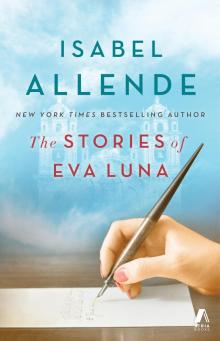 The Stories of Eva Luna
The Stories of Eva Luna The House of the Spirits
The House of the Spirits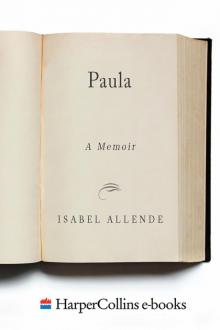 Paula
Paula Ines of My Soul
Ines of My Soul Of Love and Shadows
Of Love and Shadows Kingdom of the Golden Dragon
Kingdom of the Golden Dragon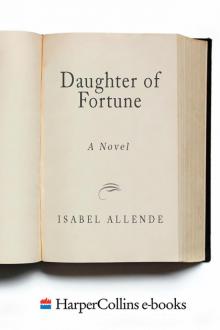 Daughter of Fortune
Daughter of Fortune City of the Beasts
City of the Beasts Maya's Notebook
Maya's Notebook Eva Luna
Eva Luna Zorro
Zorro In the Midst of Winter
In the Midst of Winter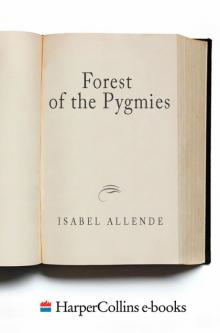 Forest of the Pygmies
Forest of the Pygmies My Invented Country: A Nostalgic Journey Through Chile
My Invented Country: A Nostalgic Journey Through Chile The Japanese Lover
The Japanese Lover Portrait in Sepia
Portrait in Sepia Island Beneath the Sea
Island Beneath the Sea The Soul of a Woman
The Soul of a Woman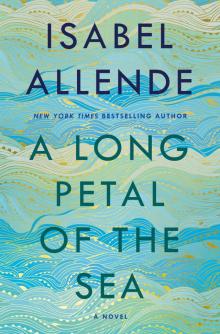 A Long Petal of the Sea
A Long Petal of the Sea Ines of My Soul: A Novel
Ines of My Soul: A Novel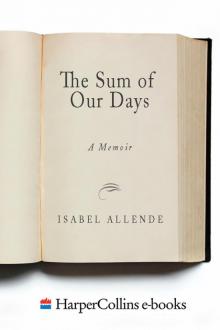 The Sum of Our Days
The Sum of Our Days